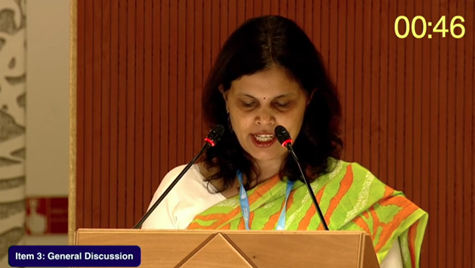India Calls for Equitable Health Systems and Global Solidarity At WHO Assembly
Addressing the 78th World Health Assembly in Geneva on Tuesday, India reaffirmed its commitment to universal health coverage and equitable access to healthcare, calling for a binding global framework that strengthens international cooperation while protecting national sovereignty. The intervention came under the Assembly’s central theme, “One World for Health.”
 |
| Image Source: PIB India |
India’s flagship initiative, Ayushman Bharat, took centre stage in the address. Srivastava noted that the scheme had expanded access to healthcare, improved infrastructure, enabled financial protection for critical treatments, and significantly accelerated digital health adoption. A recent policy expansion under the Pradhan Mantri Jan Arogya Yojana now provides free coverage to all citizens over 70 years, regardless of income, she said.
India’s progress in maternal and child health, family planning, and reduction of stillbirths and childhood mortality was acknowledged by international bodies, including UNFPA and the UN Inter-Agency Group on Child Mortality Estimation, Srivastava said. She also noted that India was recently certified Trachoma-free by the WHO and remains committed to eliminating a host of communicable diseases, including TB, Leprosy, Lymphatic Filariasis, Measles, Rubella, and Kala-azar.
The Health Secretary further emphasized capacity building in India's health workforce, pointing out that the number of medical colleges in the country has doubled from 387 to 780 in the past decade.
Looking beyond national borders, Srivastava called for a legally binding pandemic accord that would ensure equitable access to medical countermeasures, promote timely and transparent sharing of data and pathogens, and support technology transfers and health system strengthening—especially in the Global South.
She commended the WHO and its member states for progress on the proposed Pandemic Treaty, while urging that future global frameworks must be guided by fairness, inclusivity, and respect for local contexts.
India’s remarks at the Assembly come amid broader efforts to position the country as a leader in global health equity—balancing domestic achievements in healthcare access with calls for reform in how the international community prepares for and responds to health crises.
